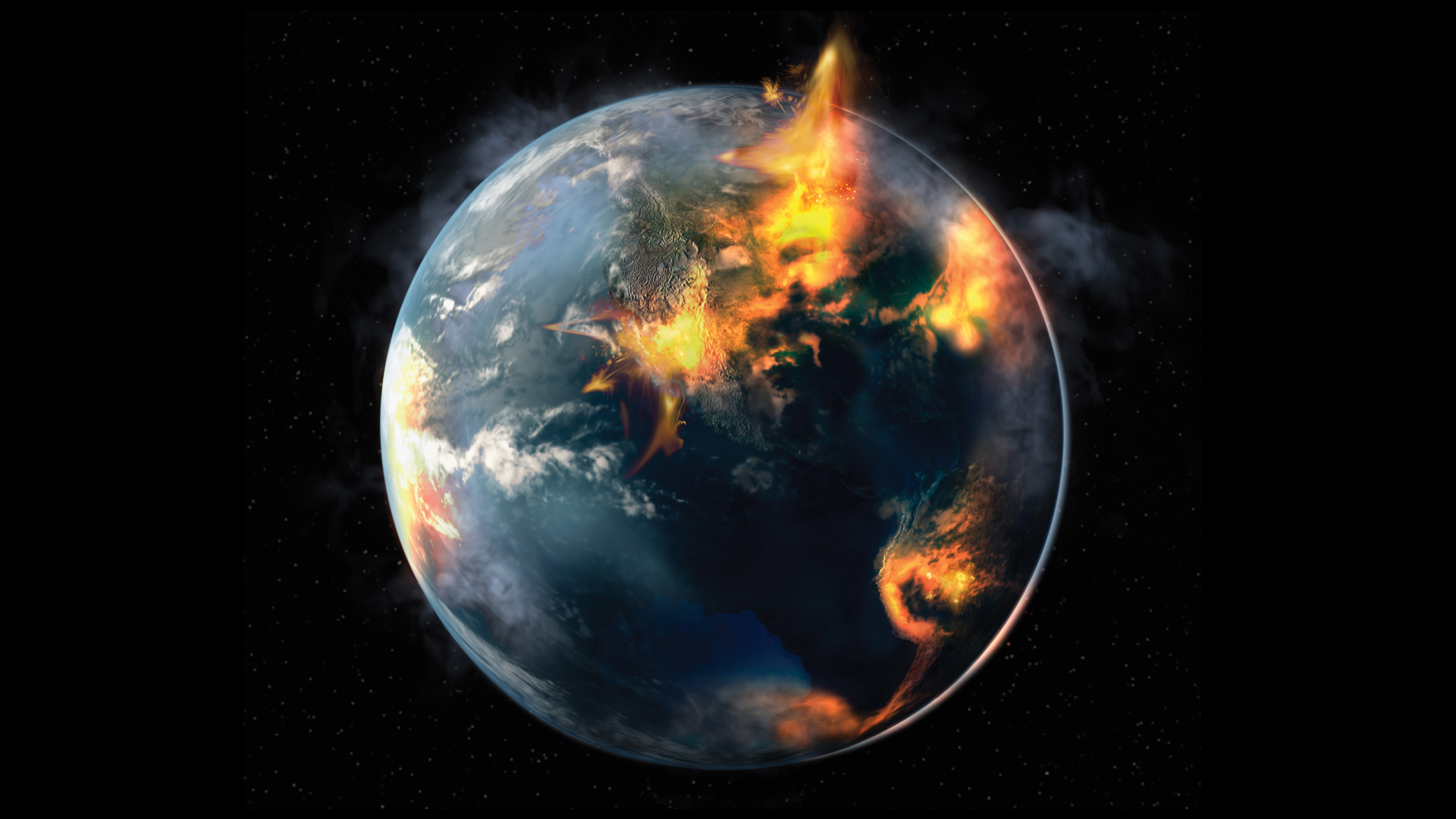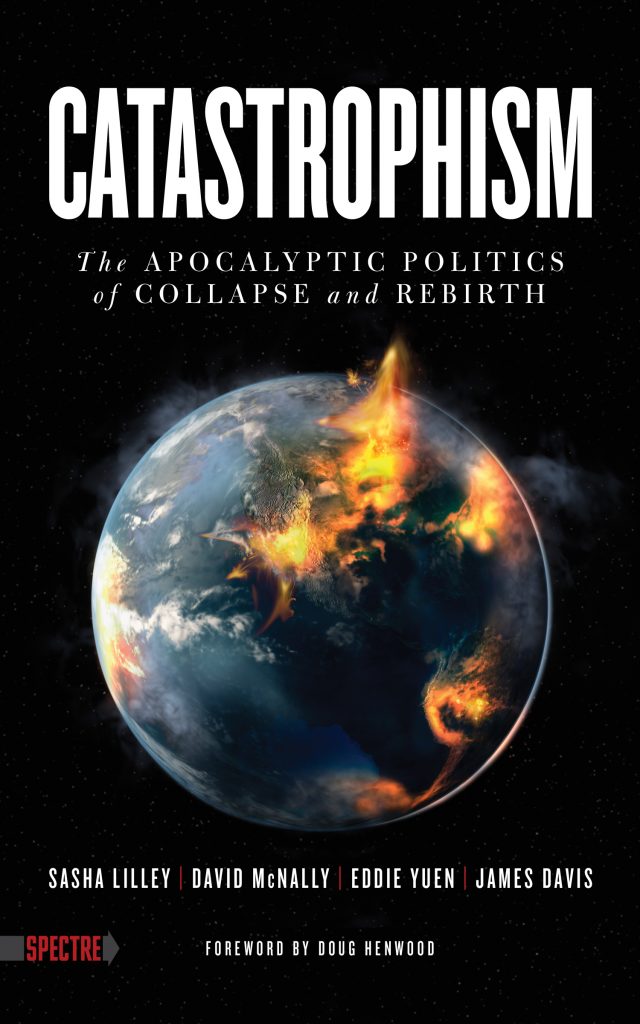by Tom Athanasiou
EcoEquity
January 31st, 2013
There are four essays in this slim volume, one on left catastrophism, one on green catastrophism, one on right catastrophism, and one on zombies. I’m most interested in the left and the greens, though we do need to keep an eye on the right. As for the zombie craze, doesn’t it just come down to the fact that modern life feels like people keep trying to eat your face off?
Doug Henwood’s preface sets the stage nicely. He immediately makes a point that all green pessimists should keep always in mind: “Catastrophe can be paralyzing, not mobilizing.” In fact, it usually is. The challenge is to remember this even as you face the real and present catastrophe that’s now visible on the horizon. It’s a dilemma, no doubt about it, but the way forward, whatever it is, is going to have to take both its horns into proper account. The question is how.
Catastrophism comes at a good time for the green movement, which is in a period of rapid change. The key point here is that, even as we struggle to come to terms with the latest climate science, we need to remember (see particularly James Davis’ essay) that catastrophism is the “native terrain” of the right. The baseline point here is that right-wing politics is all about natural limits (scarcity, austerity, etc) rather than social ones (even in a world of limits, we’d be fine if we shared the commonwealth). This is not to say that environmentalism itself is biased toward the right – just the contrary – but it has flirted with catastrophism for a long, long time, and along the way it has had a number of unfortunate dalliances, particularly with right-wing populationism and xenophobia.
The challenge now is to invent a just and inclusive politics of planetary limits, while at the same tale navigating a landscape in which “natural limits” and “scarcity” have long served to justify class stratification and economic exclusion. And this, if I may make a wild, undefended claim, is just not going to happen until we project a vision of the future that is fair, sustainable, and — here’s the problem — believable. Which is a bit of a problem, particularly because many enviros actually believe that our civilization is altogether beyond redemption.
Here’s Sasha Lilly, from her introduction:
“Catastrophism presumes that society is headed for a collapse, whether economic, ecological, social, or spiritual. This collapse is frequently, but not always, regarded as great cleansing, out of which a new society will be born. Catastrophists tend to believe that an ever-intensified rhetoric of disaster will awaken the masses from their long slumber – if the mechanical failure of the system does not make such struggles superfluous.”
Throughout Catastrophism, examples of such “ever-intensified” environmental rhetoric abound. Paul Ehrlich’s prediction of global famine by the end of the 20th Century is of course a classic (one that he’s never quite been able to live down) but there’s lots more to regret as well. Helen Caldecott and Chris Hedges are both called onto the carpet, as is Derrick Jensen, who seems intent on becoming a living caricature of self-aggrandizing green despair. Nor do the authors mount a merely cultural critique. As Lilly notes, “Catastrophic politics have a lengthy track record of failure,” and we really shouldn’t be spending our time trying to make that record even longer. We should be planning for success, and that means putting global economic justice square at the center of the green political agenda. Which, by the way, is just the sort of development that the right (see Davis’ essay) would regard as an unmitigated catastrophe.
On the related point – catastrophism as the native terrain of the right – Malthus is of course Exhibit A, though Hobbes stands close behind him. As, by the way, does James Howard Kunstler, the peak-oil snark-meister who has long rampaged against immigration. Eddie Yuen, in his essay on environmental catastrophism, expands this point nicely. He surveys “the main reasons that [it] has not led to more dynamic social movements; these include catastrophe fatigue, the paralyzing effects of fear; the pairing of overwhelmingly bleak analysis with inadequate solutions, and a misunderstanding of the process of politicization.” It’s a fine summary, and it introduces a fine essay, though I do have some quibbles, which essentially come down to my sense that the green movement is much farther along in its re-definition and renewal than Yuen gives it credit for. That said, he raises a host of good points, and when it comes to the weakness of environmentalism-as-usual, I am quite unable to improve upon his key formulation: “the pairing of overwhelmingly bleak analysis with inadequate solutions.”
The inadequacy of our solutions is indeed the problem. And it’s becoming a critical one as climate denialism collapses. Which is to say that, as the denialists lose any residual aura of scientific legitimacy, we’re being left alone with the truth – we are in very serious trouble indeed. And though we have almost all the technology we need to save ourselves, and the science to develop the rest, and plenty of money besides, few people really believe that we’re going to rise to the occasion. They go straight “from aware to despair,” and the awful truth is that the greens are not altogether innocent bystanders. Lacking as they do a vision of a just and sustainable global society, they have all too little to contribute to a believable strategy of global emergency mobilization.
The good news is that the need for such a strategy is now well understood. There’s lots of motion now, and lots of thinking, all around the world. And there’s the fact that catastrophe is not our immutable fate, not yet in any case. So the next time you feel the temptation to foretell doom, just say no. As Henwood asks, “Wouldn’t it be better to spin narratives of how humans are marvelously resourceful creatures who could a lot better with the intellectual, social, and material resource we have?”
Back to Sasha Lilley’s Author Page | Back to David McNally’s Author Page | Back to Eddie Yuen’s Author Page | Back to James Davis’s Author Page







